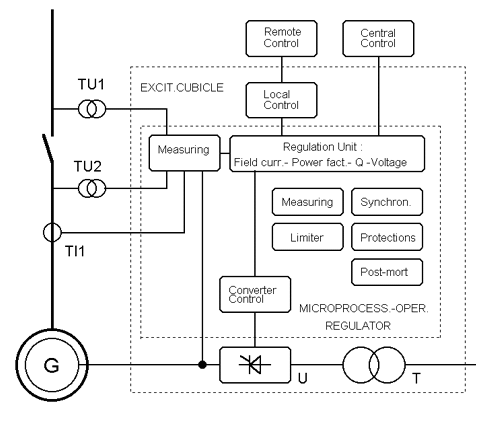 Our products
Our products  Power engeneering - sets with generators
Power engeneering - sets with generators  Static exciting of generators and drivers
Static exciting of generators and drivers
Static Excitation Systems for Generators and Motors
Basic Characteristics:
-
Excitation of synchronous machines of power from 100 kW to 100 MW
-
State-of-the-art microprocessor control with all usual additional functions
-
Use of power semi-conductor elements by Siemens - Eupec
Type series:
|
Type |
Use |
|
SBS 0 / G |
static exciter for generators up to 1 MVA |
|
SBS 1 / G |
static exciter for generators 1-5 MVA |
|
SBS 2 / G |
static exciter for generators 5-20 MVA |
|
SBS 3 / G |
static exciter for generators 20-100 MVA |
|
SBS 4 / G |
static exciter for generators 100-500 MVA |
|
SBS / M |
static motor exciter |
Technical Parameters:
Dimensions and weight:
|
Type |
width (mm) |
depth (mm) |
height (mm) |
Ibn A |
Ibmax A |
weight (kg) |
|
SBS0 |
1000 |
600 |
2 100 |
150 |
300 |
230 |
|
SBS1 |
1000 |
800 |
2 100 |
400 |
750 |
350 |
|
SBS2 |
1200 |
800 |
2 100 |
600 |
1100 |
600 |
|
SBS3 |
1200 |
800 |
2 100 |
800 |
1500 |
900 |
|
SBS4 |
1600 |
800 |
2 100 |
2000 |
3000 |
1600 |
Flow Chart:

Specification of Technical Solution and Functions:
-
Compact solution including field transformer up to 80 kVA inside one cubicle
-
Digital Tenel-AVR one-board microprocessor regulator built on circuits produced by leading manufacturers - INTEL, Thompson, etc
-
Compact solution with excit.rectifier, field suppress.., over-volt. protection on semi-cond.modul..

-
Possibility of field cubicle completing with complete generator and/or motor protection
-
Choice possibility of regulation: Voltage - Power factor - Reactive power - Field current
-
Implemented additional functions in AVR: stator and rotor current limiters, protection against machine oversaturation U/f, keeping guard over underexcitation limit
-
Stand-by system of generator protections in AVR
-
RS 485 serial communication interface by Modbus RTU protocol for connect. to central control
-
Possibility of extension of AVR algorithms with auxil. drives control and set appliances control
-
Diagnostic functions in AVR making putting into operation and operation checking easier
-
Complete measuring of currents, voltages, outputs, power factor on the AVR display
-
Fitting of AVR with EEPROM memory for storage of parameters for putting into operation
-
Fitting of regulator with history and statistics for operation monitoring and set failure analysis.
